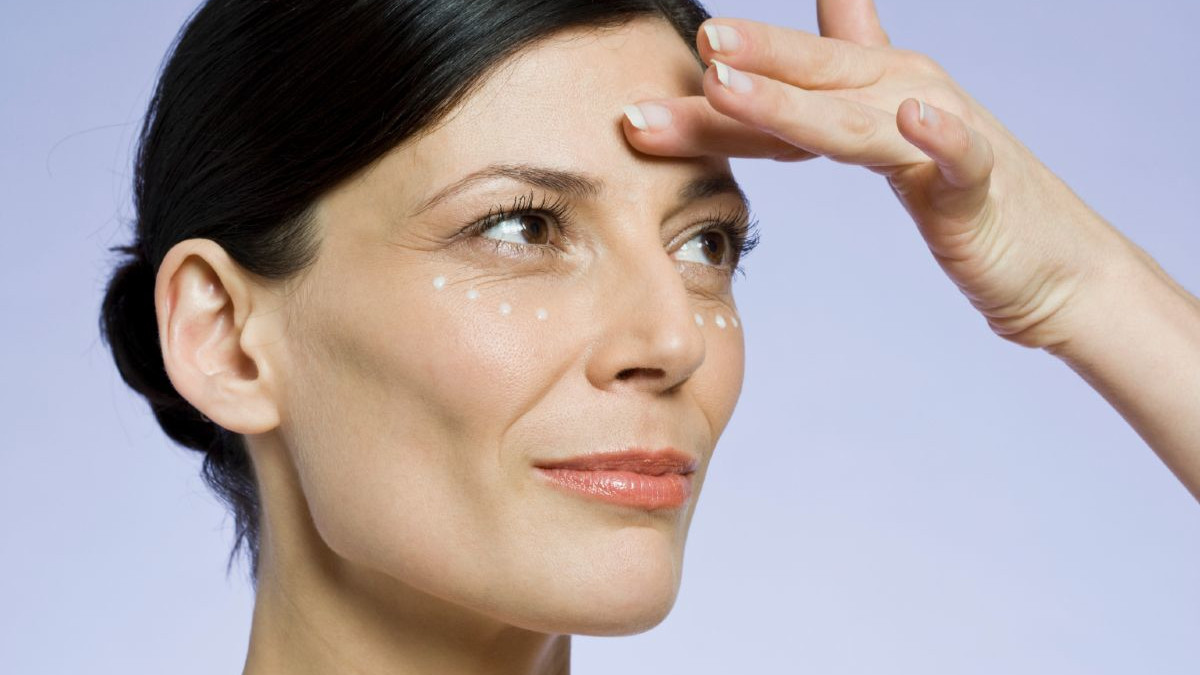Hot flashes. Sleepless nights. Weight gain. Intense crabbiness. You don’t have to struggle through symptoms.
Just like booking an Eat-Pray-Love solo trip abroad or visiting a plastic surgeon, bringing up the (formerly) “silent passage” is no longer taboo. Experts and real women revealed all about “second springs” for our by-the-decades survival guide. Read on to find out how to outwit, outplay and outlast the next chapter in your life.
In your 30s: what’s happening to me?
“By the time you reach 35, your fertility starts to gradually decline and it may become more challenging to get pregnant,” says Alyssa Dweck, M.D., co-author of V Is for Vagina (Ulysses). Levels of the hormones estrogen and progesterone slowly decrease, as do the number and quality of eggs your ovaries release.
Become your healthiest self. What you do now impacts how early menopause starts, how intense the symptoms are and how they affect your body. “Women who are in better physical shape before menopause are more likely to maintain a reasonable body weight and reduce their risk of disease after the change,” says Dr. Dweck. So get into a good-health groove.
Bust stress. Mini meltdowns will be happening. “Devise a go-to stress management technique to help alleviate menopause-related anxiety,” advises Jennifer Landa, M.D., chief medical officer of the BodyLogicMD women’s and men’s health office in Orlando, Florida, and co-author of The Sex Drive Solution for Women (Atlantic). Try tai chi or yoga, or turn to technology by creating a peaceful playlist on your iPod and using sites like calm.com for guided relaxation
Drop pounds. Carrying excess weight worsens menopause symptoms. Since your metabolism slows as you get older, find a physical activity you love now (biking, swimming, hiking) and eat healthfully to slim down and beat the “middle-aged spread.”
Quit smoking. Light up and your risk of early menopause rises by about 60%, according to a study in BMC Public Health. Quit at least 10 years before menopause and you’ll be 87% less likely than current smokers to enter the change early.
Get strong. Preserve your calorie-torching muscle mass, which decreases as you age, by strength training twice weekly. One big bonus: Resistance exercises also increase bone density to prevent osteoporosis.
Boost nutrition. Phytochemicals, found in broccoli, kale and other cruciferous veggies, help your body keep hormones balanced. Ever-present B vitamins are involved in producing mood-regulating brain chemicals like serotonin. Build a healthy recipe repertoire now.
Wear SPF. Sun damage is the number one cause of fine lines and wrinkles, which worsen as estrogen levels drop during menopause, stymieing collagen production. Make wearing a broad-spectrum facial moisturizer with SPF 30 a daily habit.
Control cholesterol. LDL (“bad”) cholesterol jumps nearly 10% in the two years surrounding menopause. Eat right and exercise to keep it in a healthy range as you age.
The #1 test you need now: “Have your ob/gyn run a baseline hormone panel, which is an easy blood, saliva or urine test that determines your optimal hormone levels,” says Dr. Landa. If you decide to get hormone therapy later, your doc can use your results to put you on hormones specific to your ideal range instead of the range of an average woman.
In your 40s: what’s happening to me?
One of the first signs of perimenopause—a stage before menopause that can last up to 10 years—are changes in your menstrual cycle. Periods may become irregular, heavier or lighter, or you may skip some altogether. Fluctuations in progesterone and estrogen levels, as well as changes related to aging, contribute to different perimenopausal symptoms.
Know the signs. Worried that you find yourself welling up during ASPCA commercials or staring at the ceiling unable to sleep at night? Both insomnia and mood swings are signs of perimenopause. Joint pain, heart palpitations and forgetfulness are also on the list. “Many women are frightened that these symptoms mean something’s seriously wrong,” says Dr. Dweck. “They have no idea why they’re feeling this way.” Overcome the fear and ease symptoms with lifestyle modifications.
Hot flashes. One minute you’re on fire (off with the sweater!), the next you’re freezing (on with the sweater!). Spicy foods, caffeine, hot drinks, alcohol and stress (like that fight you keeping having with your teenage daughter) are all common triggers. Try to avoid them.
Increased anxiety. Life changes (kid switching schools, moving to a new town) along with hormonal fluctuations are major sources of stress. Tap into om mode with relaxation techniques or exercise for frazzled moments. A recent study found that middle-aged women who engaged in 50 minutes of aerobic exercise four times per week for six months experienced reduced night sweats, fewer mood swings and less irritability compared with those who didn’t. Plus, moderate exercise reduces levels of the stress chemicals cortisol and adrenaline.
Joint pain. Although the cause is unclear, about 40% of women approaching menopause experience aching joints. “Ease the pain by taking omega-3 fish oil supplements with 500 to 1,000 mg of DHA and EPA [combined], which help reduce inflammation,” explains Susan Dopart, M.S., R.D., author of A Recipe for Life by the Doctor’s Dietitian (SGJ Publishing).
Sleepless nights. About 60% of women report disturbed zzz’s during perimenopause thanks in part to the decline of sleep-promoting progesterone (not to mention waiting up for your kids to make curfew). Good sleep hygiene is critical. Establish soothing bedtime habits: Take a bath, sip chamomile tea, turn off the TV one to two hours before bed. And for short-term use, consider OTC meds like Tylenol PM (drugstore.com, $5) or Benadryl (drugstore.com, $5), suggests Manhattan-based ob-gyn Tara Allmen, M.D., a nationally certified menopause practitioner.
Decreased sex drive. Lower levels of estrogen cause those “not tonight, honey” moments, notes Dr. Landa. Plus, changes in your body can further decrease sexual desire, as can stress and lack of sleep. Communicating with your spouse about your emotional and physical needs (like incorporating more foreplay to feel aroused) is key.
Rx relief. Talk to your ob/gyn about these two prescriptions, which can ease symptoms:
- Low-dose birth control pills: They’re good for regulating hormones if you’re a nonsmoker. “You can take active pills the entire month and skip the placebos. Most women can stay on them until they reach menopause, which a blood test can determine,” says Dr. Allmen.
- Lysteda: Many people think periods dwindle to a trickle as you age. Not true. “In reality, many women find they get heavier, which contributes to anemia,” says menopause expert Donnica Moore, M.D. She prescribes Lysteda, a medication to treat heavy menstrual bleeding.
In your 50s: what’s happening to me?
The average woman hits menopause at age 51. Ovaries stop secreting estrogen and progesterone and ovulation ends. Once you’ve gone without menstruating for a year, consider yourself postmenopausal.
Conquer these symptoms. A whopping 72% of women with menopausal issues aren’t treated. Why? “Fears about hormonal therapy and confusion about the safety and effectiveness of other options keep women from seeking help,” says Cynthia Stuenkel, M.D., clinical professor of medicine in the division of endocrinology and metabolism at the University of California-San Diego. But those aren’t your only options.
While nearly 25% of women won’t have bothersome symptoms, most of us will, and they last for four years on average. “It’s not like menopause symptoms will kill you, but you don’t have to suffer!” says Hilda Hutcherson, M.D., a clinical professor of obstetrics and gynecology at Columbia University Medical Center in New York City. The Endocrine Society developed the Menopause Map to help you navigate treatment choices. Also, experiment with solutions like the ones our experts recommend below.
Do away with hot flashes and night sweats. When dressing in layers and waking up drenched in sweat get old, consider black cohosh. Popping high doses of the herb reduced the number of hot flashes by a third for women who took it for a year in one study, says Dr. Allmen. Try 20 mg of the brand Remifemin (drugstore.com, $21) twice a day. Not interested in cohosh? Try Poise’s roll-on cooling gel (drugstores nationwide, $8).
Turn off tension. Daily pressures can crank up your worry meter, and anxiety makes you up to five times more vulnerable to hot flashes. Dr. Hutcherson notes that many of her patients respond well to acupuncture. “It addresses anxiety and stress as well as difficulty sleeping and hot flashes,” she says.
Overcome insomnia. Being pulled in a dozen different directions and can’t wind down and catch some shut-eye? Consider prescription sleep aids like Ambien or Lunesta.
Sharpen a foggy brain. To reiterate: You’re not losing your marbles. Fuzzy-headed happenings (where is my purse?) are a real phenomenon for menopausal women, according to research from the University of Rochester. Donnica Moore, M.D., advises patients to address sleep problems first: “Exhaustion is usually at the root of concentration and focus issues,” she says.
Up your pleasure. Enjoying intimate moments is tricky when it hurts to have them. Painful sex is most likely caused by declining estrogen levels that lead to down-there dryness. Try moisturizers like Replens (drugstore.com, $17) and lubricants like KY Jelly (drugstore.com, $5) to enhance comfort.
Beat irritability. Sufficient sleep helps (yes, we know; easier said than done), and some women find OTC meds such as Estroven or Amberen useful.
The truth about hormone therapy
First we heard it raises your risk of heart attacks, blood clots, breast cancer and stroke. Then word was it’s safe. Today the tide has turned back to hormone therapy (HT) as a viable option if you’re suffering from moderate to severe symptoms, are younger than 59, aren’t at an increased risk of heart disease or stroke and don’t have a personal history of breast cancer.
“It’s safe overall for women within 10 years of the start of menopause,” says Dr. Stuenkel. “The risks are real but they’re small, and HT remains the best way to improve hot flashes, sleep disruption and vaginal symptoms.” The U.S. Preventive Services Task Force recently concluded HT shouldn’t be used to prevent chronic diseases like dementia. Short-term use at the lowest dose is the safest course.
Three chats you must have about “the change”
Yes, ladies. There’s more than one “sex talk” you need to think about. After interviewing experts and real women across the country we found there are three critical conversations you should start when it comes to menopause.
In your 30s…talk to your mom. For Mary Mustakas, 46, that chat explained an eye-opening event of her youth: “I walked in on mom sitting at her sewing machine, sweat pouring down her face with a fan blowing on her—completely naked!” she says. The hot flash incident wasn’t discussed for more than a decade, but now that Mustakas is dealing with symptoms of perimenopause, she’s grateful that her mom opened up about what to expect. While your experience won’t be identical to mom’s (other factors, like your health, play a role), your onset and symptoms may be similar. Research shows, for example, that you’re six times more likely to go through early menopause if your mom or sister did.
In your 40s…talk to your family. “We take our worst emotions out on the people we love most,” says Alyssa Dweck, M.D. “Mood swings in the years before menopause can make it seem like you’re driving a truck and your partner is the pavement.” Let your family know there will be times when you won’t feel your best and will be short-tempered but you’re trying.
In your 50s…talk to your doctor. Approximately 50 to 60 percent of women experiencing menopausal symptoms don’t chat up their doc about the change. “Often that’s because they don’t know what to ask,” says Cynthia Stuenkel, M.D., clinical professor of medicine in the division of endocrinology and metabolism at the University of California-San Diego. Questions you should ask might include:
- Could my symptoms come from something other than menopause?
- What non-hormonal prescription and over-the-counter drugs interact with my current medications?
- If I do start hormonal therapy, what’s the lowest dose that will work for me?
Think up questions ahead and make a customized list for your next doctor’s visits and get the answers you need to smooth your transition.
But there's more. Check out these bussin stories:
- Travel
 5 volunteering jobs where it’s your duty to cuddle exotic animals Science says anxiety and stress levels drop in people who cuddle animals. But to be frank, you wanted to do it any way.
5 volunteering jobs where it’s your duty to cuddle exotic animals Science says anxiety and stress levels drop in people who cuddle animals. But to be frank, you wanted to do it any way. - Health Love
 12 badass things you didn’t know about the vagina It wasn't until the 1990s that researchers even used MRIs to study its internal structure and sexual function.
12 badass things you didn’t know about the vagina It wasn't until the 1990s that researchers even used MRIs to study its internal structure and sexual function. - It Happened To Me
 I’m a Lyft driver and asked riders to tell me their deepest confessions You'd be surprised what people told me over the course of my 60 day experiment.
I’m a Lyft driver and asked riders to tell me their deepest confessions You'd be surprised what people told me over the course of my 60 day experiment.


